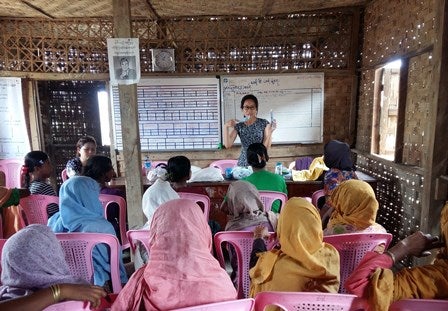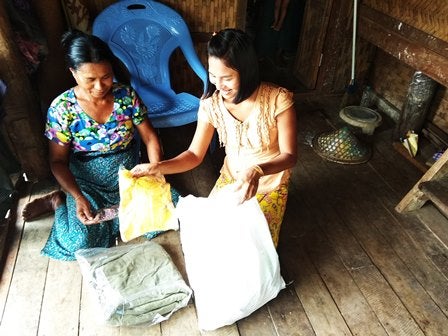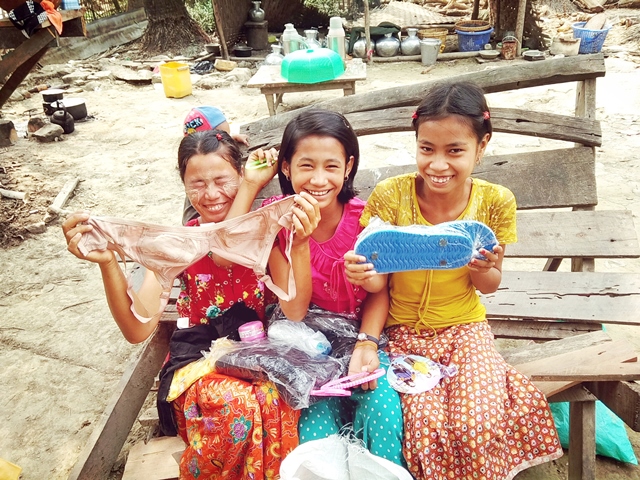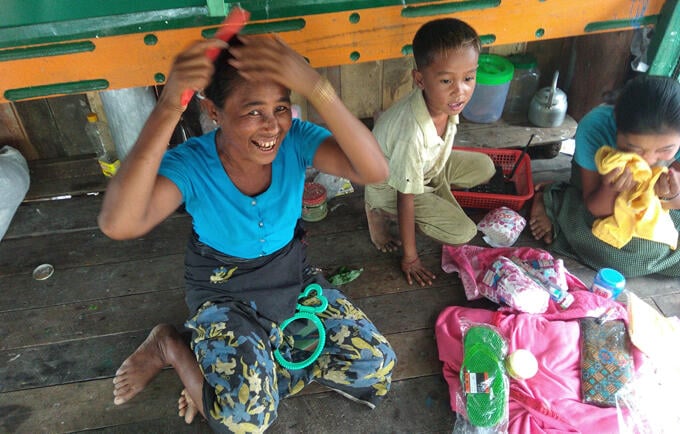A catching smile spreads across her face as she opens the dignity kit in her simple home. She begins to laugh as she tries out the comb and mirror. Her daughter leans over to touch the bright yellow t-shirt, and to smell its clean newness.
The mother and daughter in Sin Pite village are two of both Muslim and Buddhist women in Myanmar’s restive Rakhine State who have just received a UNFPA dignity kit. As the monsoon season approaches, a humanitarian crisis continues to unfold on both sides of the Bangladesh-Myanmar border, and the needs are great across all ethnic communities.
Alleviating life in some of the worst camp conditions in Rakhine
The world’s attention is on the 670,000 people who have fled from Myanmar to Bangladesh. At the same time, several hundred thousand people who identify as Rohingya remain in Myanmar’s Rakhine State, where they continue to face restrictions to their movement that severely compromise their rights and obstruct their access to health, livelihoods, protection, education, and other essential services. 130,000 of these people are confined to camps, and among the hardest hit people are those detained in the Pauktaw camps, which have some of the worst conditions of in Rakhine.

To alleviate the situation for women and girls in the Muslim Pauktaw camps, and also in the nearby ethnic Rakhine villages, UNFPA has delivered over 1,200 dignity kits ahead of the monsoon rains. A priority was made for female-headed households and for women of reproductive age. In the Kan Site village, the government midwife who joined the UNFPA/IOM mission also gave an education session on sexual and reproductive health and antenatal care.
“We have been brushing our teeth with salt”
Many of the women who received a kit are severely deprived, especially those who live in camps. To help the make the most of the kit contents, UNFPA staff conducted information sessions about hygiene and health, and about how to best use the items in the kits, including sanitary pads, underwear, tooth brushes and tooth paste. There were also discussions about menstruation, its cultural and social aspects, and about ways to avoid feelings of impurity and shame during the menstrual period.

“The sanitary pads and the underwear are essential for me and my two daughters”, said a 46-year-old woman in the Nget Chaung camp 2.
In the nearby Kan Site village, a 35-year-old mother of three explained that the most important items for her family’s hygiene were the tooth brush and paste: “We have been cleaning our teeth with salt because we cannot afford to buy tooth brushes and tooth paste.”
In the Kan Site village, a 42-year-old woman is looking forward to wearing her new long sleeve t-shirt when she goes fishing with her husband at sea during long days under the scorching sun: “It will help protect my skin against sunburn.”
During the last two weeks of March in 2018, UNFPA and partners International Organization for Migration and Lutheran World Federation distributed 1254 dignity kits to women and girls in Pauktaw Township in Myanmar’s Rakhine State.
UNFPA and other aid organizations are operating in Rakhine in a very challenging context, and with severe restrictions to humanitarian access. The Pauktaw dignity kit distribution is one of many UNFPA activities and projects that support the health and security of women and girls from all communities in central and northern Rakhine.



